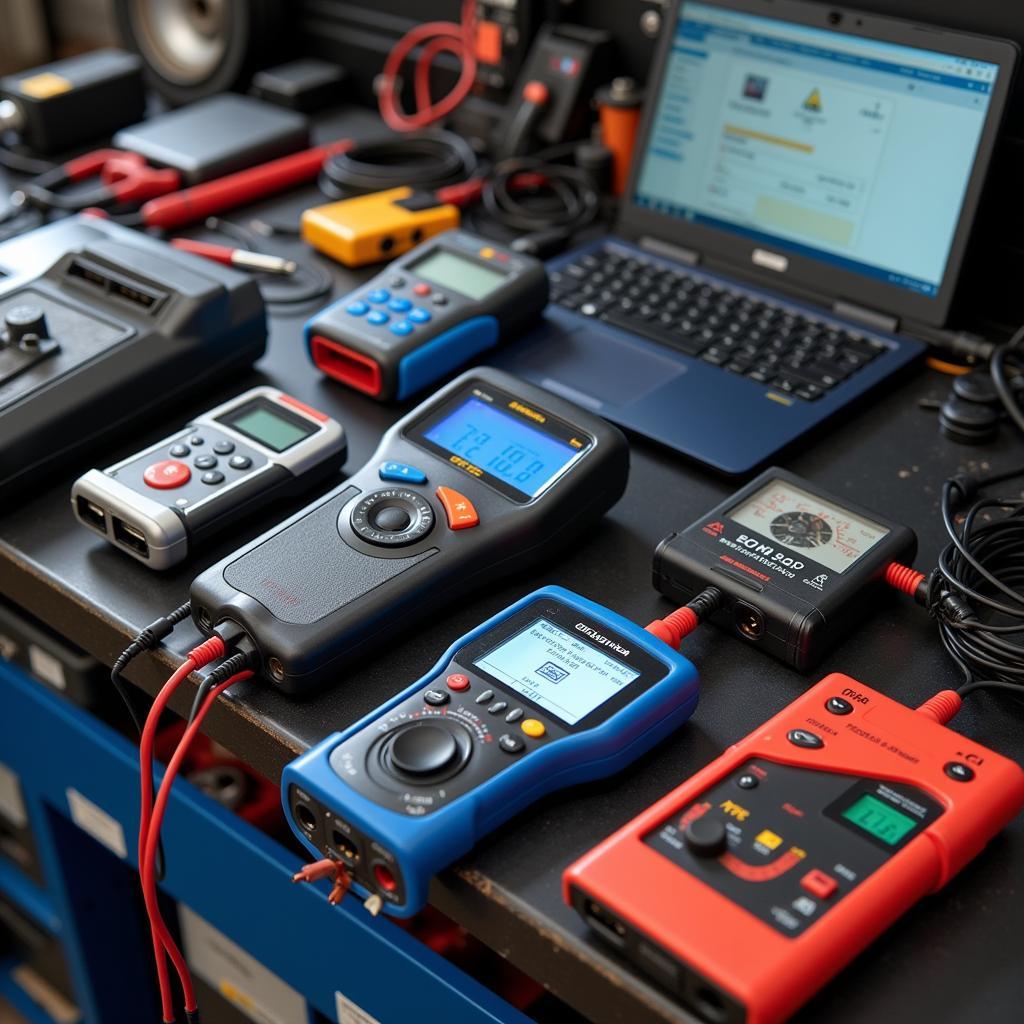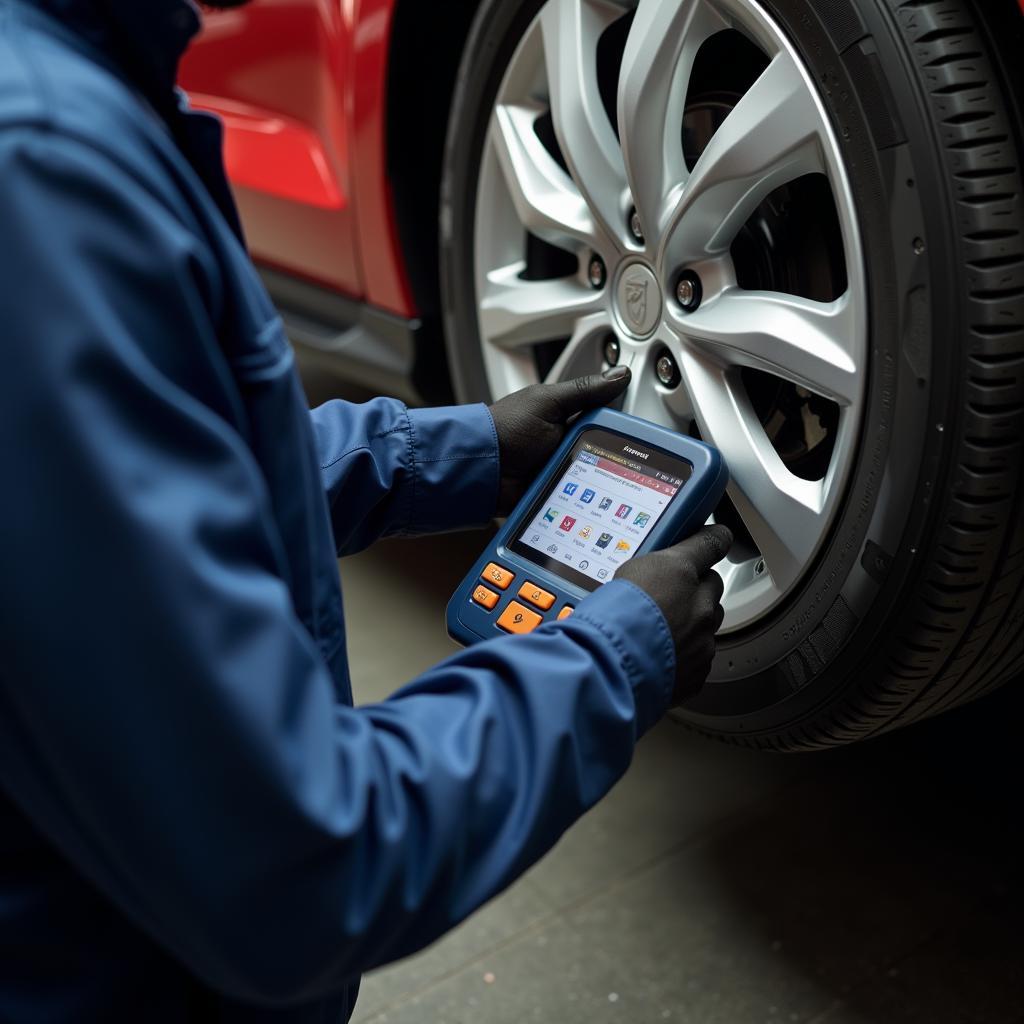Finding the Best Car Diagnostic Tool For The Money can be overwhelming, especially with so many options flooding the market. Whether you’re a DIY enthusiast or a seasoned mechanic, having the right diagnostic tool can save you time, money, and unnecessary headaches. This comprehensive guide will help you navigate the world of car diagnostic tools, providing you with the knowledge to make an informed decision.
 Best OBD2 Scanners for DIY Mechanics
Best OBD2 Scanners for DIY Mechanics
Understanding Your Needs: What to Look for in a Car Diagnostic Tool
Before diving into the specifics of different tools, it’s crucial to identify your individual needs. Ask yourself these key questions:
- What’s your budget? Diagnostic tools range from affordable handheld devices to professional-grade systems costing thousands of dollars.
- What make and model is your vehicle? Some tools are designed for specific car makes, while others offer broader compatibility.
- What level of technical expertise do you have? User-friendly interfaces are perfect for beginners, while experienced mechanics might require more advanced features.
- What are you hoping to achieve with the tool? Do you want to read and clear basic engine codes, or are you looking for in-depth analysis and programming capabilities?
Types of Car Diagnostic Tools: From Basic to Advanced
The market offers a wide array of car diagnostic tools, each with its own strengths and limitations. Here are the most common types:
1. Code Readers: Entry-Level Diagnostics
Code readers are the most basic and affordable type of car diagnostic tool. They can read and clear basic engine codes, such as those related to the check engine light.
- Pros: Affordable, easy to use, compact.
- Cons: Limited functionality, may not read all codes.
2. OBD2 Scanners: A Step Up in Functionality
OBD2 scanners offer more advanced features compared to basic code readers. They can access a wider range of vehicle systems, providing live data, sensor readings, and more detailed diagnostic information.
- Pros: More comprehensive diagnostics, live data streaming, often include additional features like smog test readiness.
- Cons: Can be more expensive than code readers, may require some technical knowledge.
3. Professional-Grade Scan Tools: For the Serious Mechanic
Professional-grade scan tools are the top-of-the-line option, offering the most comprehensive diagnostics and advanced features. They can perform bi-directional control, programming, coding, and access manufacturer-specific systems.
- Pros: Unmatched diagnostic capabilities, access to all vehicle systems, advanced features like coding and programming.
- Cons: Expensive, complex to use, require extensive technical knowledge.
 Professional Mechanic Using Diagnostic Tool
Professional Mechanic Using Diagnostic Tool
Key Features to Consider: Making the Right Choice
When comparing different car diagnostic tools, keep these essential features in mind:
- Vehicle Coverage: Ensure the tool is compatible with your vehicle’s make, model, and year.
- Software Updates: Regular software updates are crucial for maintaining compatibility with newer vehicle models and accessing the latest features.
- Data Logging and Playback: This feature allows you to record data streams and review them later for in-depth analysis.
- Live Data Streaming: Access real-time sensor readings and vehicle performance data.
- Bi-Directional Control: This advanced feature allows you to test components by commanding them to activate, such as turning on the fuel pump or cycling the ABS system.
- Coding and Programming: Professional-grade tools offer coding and programming capabilities, allowing you to customize vehicle settings and perform software updates.
Expert Insight: Choosing the Right Tool for You
“Investing in a quality car diagnostic tool is essential for any DIY mechanic or professional,” says John Smith, a certified automotive technician with over 20 years of experience. “The right tool can empower you to diagnose and fix car problems efficiently, saving you time and money in the long run. Remember to consider your individual needs, budget, and technical expertise when making your decision.”
Conclusion: Empower Yourself with the Best Car Diagnostic Tool
Choosing the best car diagnostic tool for the money is a crucial investment for any car owner or mechanic. By understanding your needs, exploring the different types of tools, and considering key features, you can confidently select the perfect tool to keep your vehicle running smoothly. Remember, a reliable diagnostic tool is your key to efficient and cost-effective car maintenance.
FAQs
Q: Can I use a car diagnostic tool on any car?
A: Not necessarily. Some tools are designed for specific makes and models, while others offer broader compatibility. It’s essential to check the tool’s specifications to ensure it supports your vehicle.
Q: Do I need a professional-grade tool for basic diagnostics?
A: No, a basic code reader or OBD2 scanner is sufficient for reading and clearing basic engine codes. Professional-grade tools are more suitable for advanced diagnostics, coding, and programming.
Q: How often do car diagnostic tools need software updates?
A: Software update frequencies vary depending on the manufacturer. It’s recommended to check for updates regularly, ideally every few months, to ensure compatibility with the latest vehicle models and features.
Q: Can a car diagnostic tool fix car problems?
A: Diagnostic tools primarily help identify problems. While some advanced tools offer bi-directional control for component testing, they don’t inherently fix issues. You’ll need the appropriate tools and knowledge to carry out repairs.
Need Help? We’re Here for You!
Still unsure about the best car diagnostic tool for your needs? Don’t hesitate to reach out to our expert team. We’re available 24/7 to provide personalized guidance and help you find the perfect solution. Contact us via WhatsApp: +1(641)206-8880 or email: [email protected].

Leave a Reply